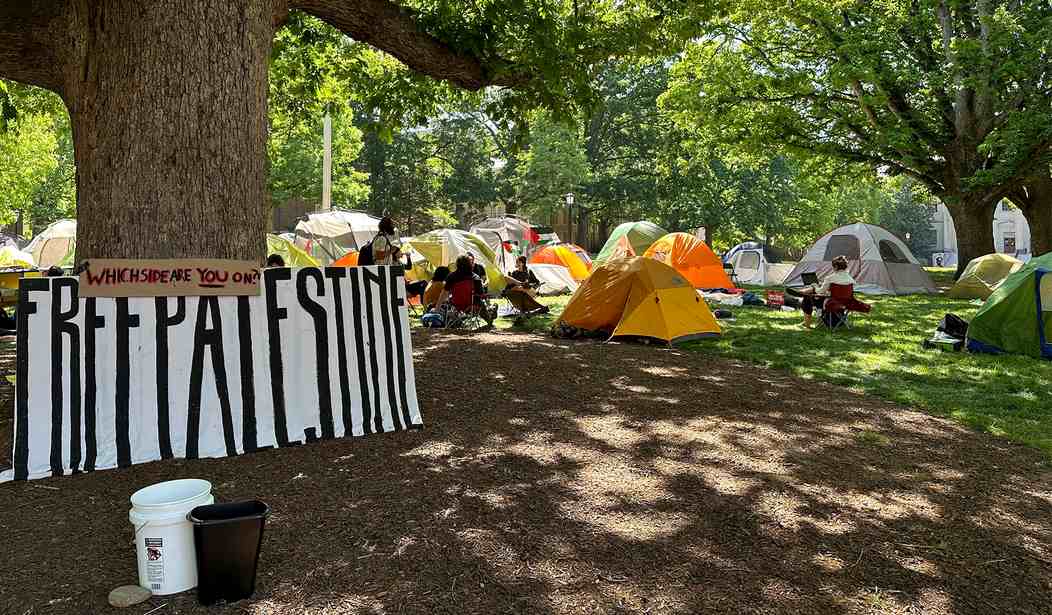On Wednesday, the latest edition of The Economist/YouGov poll came out, and the takeaways include some rather bad news for pro-Hamas agitators on college campuses, or, as the poll puts it, "pro-Palestinian." There are also quite the telling findings about how those who plan to vote for President Joe Biden and his fellow Democrats feel about the conflict and our ally in the Middle East.
Close to a majority of voters, at 49 percent, have heard "a lot" about the arrest of pro-Hamas agitators on college campuses, so they're at least staying informed on the issue. A majority of overall respondents and voters--50 percent and 55 percent, respectively--oppose the protests.
The only demographic where a majority say they support the protests is the 55 percent of liberals who do so. A plurality of 18- to 29-year-olds (42 percent), those who intend to vote for Biden (47 percent), Democrats (43 percent), and Lean Democrats (45 percent) support them, though.
The latest poll from The Economist/@YouGovAmerica is bad news for the pro-Hamas protests on college campuses, referred to here as "pro-Palestinian." There's also a very telling partisan divide though.
— Rebecca Downs🇺🇸🟦🇮🇱 (@RebeccaRoseGold) May 9, 2024
These graphs were included in press releases made available for download. pic.twitter.com/iaFEDh9ZS2
A plurality of voters, 38 percent, say that college administrators have been "not harsh enough" in responding to such protests. The breakdown by political party and age group is stunning. While a plurality, at 39 percent, of those 18-29 say they're "not sure" about the response, just 17 percent say it's been "not harsh enough." Twenty-eight percent say it's been "too harsh." That number is at 8 percent for voters over 65, while a majority, at 52 percent, say the response has been "not harsh enough."
Just 13 percent of those who intend to vote for Biden say the response has been "not harsh enough," while 28 percent each say it's been "too harsh" or "about right." That's not too far off from the plurality, who at 31 percent, say they're "not sure." A plurality of liberals, actually, at 34 percent, say the response from college administrators has been "too harsh," while just 9 percent say it's been "not harsh enough." Twenty-eight percent of Democrats say as much, while just 14 percent say it's been "not harsh enough."
Recommended
Those who intend to vote for Trump are the least likely to say the response has been "too harsh," with 4 percent saying so. Along with the 65 percent of conservatives who also say so, they're also the most likely to believe the response has been "not harsh enough." Similarly, just 5 percent of conservatives and Republicans say the response has been "too harsh." A majority of Republicans, at 59 percent, also say it's been "not harsh enough."
Voters are much more evenly split as to the police response, with 28 percent of voters saying the response has been "about right" and 27 percent saying it's been "not harsh enough."
Another graph made available for download shows how respondents feel about the response from college administrators/police. Again, there is a significant partisan divide! pic.twitter.com/MUXpvaBDNT
— Rebecca Downs🇺🇸🟦🇮🇱 (@RebeccaRoseGold) May 9, 2024
Respondents were also asked to choose all the options that they think should apply to "student protesters who have set up encampments on their college campuses." The most common options among voters were that the protesters should be "forcibly removed" and "fined," with each receiving 41 percent support. Thirty-seven percent said they should be "arrested," while 36 percent said they should be "expelled," and 34 percent said they should be "suspended."
While 17 percent of voters say students "shouldn't face any consequences," that's the most selected choice for liberals, with 35 percent saying so. Twenty-five percent of those who intend to vote for Biden also say so, as do 28 percent of Democrats, which is one of the most popular options for those demographics. Among those who are 18-29, "they shouldn't face any consequences" is also the most popular option, with 33 percent saying so.
The poll also looks to an interesting framing of a ceasefire, which has often been used as a pro-Hamas, anti-Israel talking point. While 68 percent of voters say they support a ceasefire when the question is framed as "Would you support or oppose Israel and Hamas agreeing to a ceasefire now?", that number is just 29 percent when the question is "Would you support or oppose Israel and Hamas agreeing to a ceasefire even if Hamas does not release its remaining hostages to Israel?" A plurality, at 48 percent, say they're opposed. Sure enough, 29 percent of voters are opposed, though a plurality of those who intend to vote for Biden (46 percent), liberals (48 percent), and Democrats (43 percent) are still in support.
The poll also looks at the overall Israel-Hamas conflict. A plurality of voters, at 36 percent, say their sympathies are with the Israelis, while 32 percent say it's "about equal" between Israelis and Palestinians.
In an illustration of how anti-Israel the Democratic Party is with many far-leftists and antisemites as part of the base, those who intend to vote for Biden (26-14 percent), liberals (34-12 percent), and Democrats (26-15 percent), are much more likely to say they sympathize with Palestinians over Israelis. Pluralities of these demographics say they sympathize with both "about equal." Overall, just 16 percent say they sympathize more with Palestinians.
The poll was conducted May 5-7, with 1,813 total respondents, including 1,598 registered voters. The margin of error for voters is plus or minus 2.8 percentage points.
Just before the poll was conducted, and on the day it was released, an interview between Biden himself and CNN's Erin Burnett aired confirming that the president would halt ammunition to our ally in the Middle East if Israel continued its operation in Rafah. This story clearly isn't going away any time soon.

























Join the conversation as a VIP Member